Tous les articles
Triés par date de parution
A magnificent and unanticipated pleasure!
Par Prof. Guy Stanley le 27 décembre 2010
The Italian historian Benedatta Craveri remarks in l’Âge de la conversation (Gallimard 2002) that the conversation of the Salon over the course of a century or more, beginning in the 17th century after the the French wars of religion, developed a civilizing ideal of social conduct based on courtesy and mutual pleasure. Over the course of its development, as other historians noted (e.g. Anne Martin Fugier in her account of Les salons de la Troisième Républic (Perrin/Tempus 2009)) the ideal of sociable conversation deepened as participation broadened to include writers, artists, and politicians.
A Special Thanks to David and Diana Nicholson for Wednesday Nights
Par The Hon. John Ciaccia le 27 décembre 2010
We are grateful for the opportunities you have given us to meet, to talk , to sometimes dispute but always to enjoy your company and that of the many and varied people who have joined you on Wednesday Night.
You have opened your home and your hearts to us all. We have been fortunate to have had this oasis in the midst of apathy inattention and confusion. A place where the events of the time will have been reviewed, discussed, discarded, embraced but never overlooked. They have enriched us all- and left us yearning for more.
To be or not to be, is still the big question
Par P.A. Sévigny le 27 décembre 2010
While death and taxes continue to be the two immutable factors of modern life, questions raised by legal euthanasia seemed to be less concerned with the inevitable end of life as opposed to the where, when and especially how the lights get turned off.
“It’s not so much about if we’re going to die,” said Dr. Stephen Liben. “It’s all about how we’re going to die.”
Guns and money running for the exits: Timidity and introspection characterize the latest G20 and NATO summits
Par Robert Presser le 27 décembre 2010
Two important international meetings took place in November – the G20 met in Seoul and NATO met in Lisbon. While one is an international economic forum and the other is a military alliance originally conceived to prevent Soviet agression, their outcomes are linked by a lack of vigour and funding. The flaccid direction from both of these summits does not bode well for the near future of economic cooperation nor for a coordinated response to serious threats from Iran, the Taliban/Al Qaida and North Korea.
Will the IMF bailout help Ireland recover from the debt crisis?
Par Arthur-Paul Strigini le 27 décembre 2010
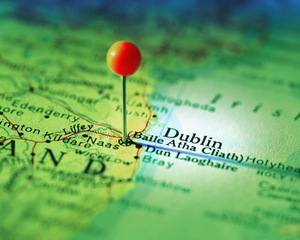 How will the Irish economy recover from the debt crisis? Will the bailout plan work? And will the Irish economy bounce back quickly? How will the Irish people be affected by this situation? These are some of the questions one can ask after the events of the last few weeks.
How will the Irish economy recover from the debt crisis? Will the bailout plan work? And will the Irish economy bounce back quickly? How will the Irish people be affected by this situation? These are some of the questions one can ask after the events of the last few weeks.
Supreme Court compromises home privacy
Par Beryl Wajsman le 1 décembre 2010
We have all heard the expression that a “person’s home is their castle.” It is more than a saying. It has for hundreds of years been incorporated into the body of our laws. Clearly one can understand that there are certain exceptions. If we hear some horrible scream or smell or smoke coming from our neighbour’s home or apartment we would be irresponsible not to call the appropriate authorities and they would be perfectly right to come and investigate. But how do you feel about information collected about you through the endless panoply of wires and meters governing our abodes being handed over to public security authority? A great danger we think. Yet that is what the Supreme Court has opened the door to.
La crise d’Octobre: l’arbre qui nous cache la forêt
Par Pierre K. Malouf le 4 novembre 2010
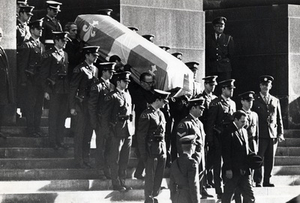 Déjà quarante ans ! Il fallait commémorer la crise d’Octobre. Les journaux, la télé, la radio ont fait oeuvre utile. Les survivants ont révisé leurs rôles, raccommodé leurs costumes, retouché leur maquillage, puis, devant un vaste parterre de journalistes et de commentateurs brandissant micros et caméras, ont récité et mimé des bribes de la tragédie qu’ils avaient improvisée il y a quarante ans. Quiconque a vécu ces événements et lu ce qui s’est dit et publié ensuite, ressort de l’exercice de cet automne avec une impression de déjà-vu. Pour ne parler que d’eux, que nous ont dit Jacques Lanctôt, Paul Rose, Robert Comeau, Marc Lalonde, Jérôme Choquette, Julien Giguère que nous ne savions déjà ? Qu’ont découvert les journalistes ? Quelles nouvelles pistes d’interprétation les commentateurs ont-ils tracées?
Déjà quarante ans ! Il fallait commémorer la crise d’Octobre. Les journaux, la télé, la radio ont fait oeuvre utile. Les survivants ont révisé leurs rôles, raccommodé leurs costumes, retouché leur maquillage, puis, devant un vaste parterre de journalistes et de commentateurs brandissant micros et caméras, ont récité et mimé des bribes de la tragédie qu’ils avaient improvisée il y a quarante ans. Quiconque a vécu ces événements et lu ce qui s’est dit et publié ensuite, ressort de l’exercice de cet automne avec une impression de déjà-vu. Pour ne parler que d’eux, que nous ont dit Jacques Lanctôt, Paul Rose, Robert Comeau, Marc Lalonde, Jérôme Choquette, Julien Giguère que nous ne savions déjà ? Qu’ont découvert les journalistes ? Quelles nouvelles pistes d’interprétation les commentateurs ont-ils tracées?
Les faits oubliés de la Crise d’octobre
Par Bernard Amyot le 4 novembre 2010
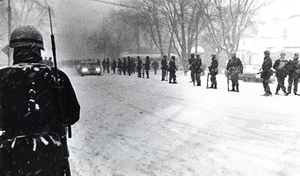 Il y a quarante ans le 5 octobre 1970, commençait la désormais célèbre Crise d’octobre avec l’enlèvement de James Richard Cross, diplomate britannique, par des terroristes du Front de libération du Québec (« FLQ »), prétextant agir au nom de la sécession du Québec et de la révolution marxiste. Le 10 octobre, ils enlevaient Pierre Laporte, fraîchement élu Ministre du travail du Québec, alors qu’il jouait au ballon avec son neveu dans la cour avant de sa maison de la rive sud de Montréal. Il sera assassiné par ses kidnappeurs 7 jours plus tard.
Il y a quarante ans le 5 octobre 1970, commençait la désormais célèbre Crise d’octobre avec l’enlèvement de James Richard Cross, diplomate britannique, par des terroristes du Front de libération du Québec (« FLQ »), prétextant agir au nom de la sécession du Québec et de la révolution marxiste. Le 10 octobre, ils enlevaient Pierre Laporte, fraîchement élu Ministre du travail du Québec, alors qu’il jouait au ballon avec son neveu dans la cour avant de sa maison de la rive sud de Montréal. Il sera assassiné par ses kidnappeurs 7 jours plus tard.
The October Crisis and the Destruction of the “Canayen” Culture
Par Graeme Decarie le 4 novembre 2010
The young professor snapped his pencil in half in an act of passionate drama. “We must define our culture,” he said. The heads of his colleagues nodded. They had to protect their culture, of course. And they were determined to do so. But first they had to figure out what it was.
Who are the victims of Quebec bashing?
Par Dan Laxer le 4 novembre 2010
Gilles Rhéaume and his Ligue Québécoise contre la francophobie canadienne are heading to the United Nations to ask the Human Rights Committee to denounce “Quebec bashing” as a form of racism, discrimination, and xenophobia.
Quebec: The most insecure province
Par Dan Delmar le 4 novembre 2010
Witnessing a hysterical Pauline Marois shrieking in the National Assembly a few days ago, describing the Québécois as a “petit people” could be interpreted as one of many signs that this province has lost its way; that it is the societal equivalent of a 13-year-old with adolescent angst and a desire to angrily lash out against authority figures.
Marois’ fit provided a rare moment of honesty and insight into the attitudes of Quebec’s sovereignist political class. The leader of the Parti Québécois wants to lead a small people – in numbers, surrounded by Anglo North America, yes – but does she also want to lead a weak people; lost, confused and distracted by the red herrings of petty linguistic squabbles?
Reseau Liberté-Québec! Quebec`s freedom network is born
Par Alan Hustak le 4 novembre 2010
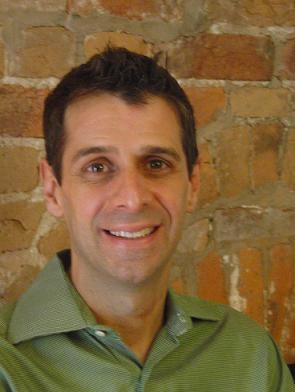 You may not have heard of the Quebec Freedom Network, but you will now. They turned people away at the door so full was its opening meeting in Quebec City this past weekend. Over 500 people listened to Ezra Levant, Tasha Kheiriddin, Adam Daifallah and Eric Duhaime advocate for a freer, less invasive Quebec state with a dramatically reduced bureaucracy and a greater emphasis on self-reliance. The next gathering of the Reseau Liberte- Quebec will be in Montreal, perhaps even on the West Island
You may not have heard of the Quebec Freedom Network, but you will now. They turned people away at the door so full was its opening meeting in Quebec City this past weekend. Over 500 people listened to Ezra Levant, Tasha Kheiriddin, Adam Daifallah and Eric Duhaime advocate for a freer, less invasive Quebec state with a dramatically reduced bureaucracy and a greater emphasis on self-reliance. The next gathering of the Reseau Liberte- Quebec will be in Montreal, perhaps even on the West Island
Words do matter: Time to end the waste of so many
Par Beryl Wajsman le 4 novembre 2010
A local media ad campaign has used the slogan “words matter” for some time. Sadly that is not getting through to our intelligentsia. Words should matter and we shouldn’t waste so much time arguing what language they are spoken in.
Vera 1944-2010
Par Alan Hustak le 4 novembre 2010
 Vera Danyluk’s anger over the attempted rape of a young teenager in Montreal’s quiet, upscale Town of Mount Royal neighbourhood 40 years ago led her into a life of public service when she co-founded a Women’s Committee on Public Safety. The committee began demanding better police protection, and it helped launch her distinguished career in public service. She went on to win a seat on council, four elections as mayor of Town of Mount Royal, today a municipality in Montreal’s recently re-constituted system of municipal government, and served for eight years as Chairman of the Montreal Urban Community’s now defunct regional authority.
Vera Danyluk’s anger over the attempted rape of a young teenager in Montreal’s quiet, upscale Town of Mount Royal neighbourhood 40 years ago led her into a life of public service when she co-founded a Women’s Committee on Public Safety. The committee began demanding better police protection, and it helped launch her distinguished career in public service. She went on to win a seat on council, four elections as mayor of Town of Mount Royal, today a municipality in Montreal’s recently re-constituted system of municipal government, and served for eight years as Chairman of the Montreal Urban Community’s now defunct regional authority.
OBAMA’S CRISIS: Aftermath - The "No Fun" Zone
Par David T. Jones le 4 novembre 2010
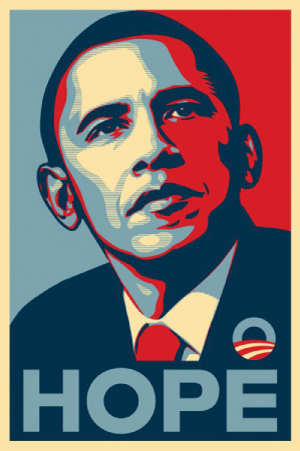 This is the time of "spin." The Democrats sound as if they were victims of an IED blast, delighted to have only lost an arm and a leg instead of two of each. The Republicans sound like roosters believing that the sun rose because they crowed.
This is the time of "spin." The Democrats sound as if they were victims of an IED blast, delighted to have only lost an arm and a leg instead of two of each. The Republicans sound like roosters believing that the sun rose because they crowed.
The reality check is more complex. The Democrats were sharply defeated, losing the House of Representatives, but not as catastrophically as was predicted earlier in the summer. And, they retained control of the Senate, saving their vulnerable majority leader Harry Reid. Moreover, Democrats gained a great, oft unmentioned prize: the governorship of California, which will assist them substantially in the 2012 presidential election.
OBAMA’S CRISIS: The political junkies meet
Par Dan Delmar le 4 novembre 2010
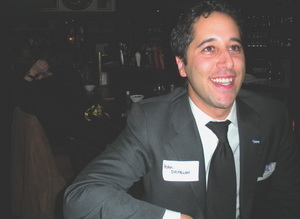 A steady stream of beer, wine and fried snacks were being served to patrons crammed into the John Sleeman Pub on Peel St. as they watched U.S. election events unfold last week on big-screen TVs, cheering and jeering with every development. The atmosphere had all the markings of a major sporting event, but the crowd wasn’t watching the Canadiens losing to the Blue Jackets. They were watching the Democrats lose the House of Representatives to the Republicans and almost lose the Senate as well.
A steady stream of beer, wine and fried snacks were being served to patrons crammed into the John Sleeman Pub on Peel St. as they watched U.S. election events unfold last week on big-screen TVs, cheering and jeering with every development. The atmosphere had all the markings of a major sporting event, but the crowd wasn’t watching the Canadiens losing to the Blue Jackets. They were watching the Democrats lose the House of Representatives to the Republicans and almost lose the Senate as well.
Confronter le grand mensonge - L'affaire Al-Durah: ACT for Canada hosts Karsenty
Par P.A. Sévigny le 4 novembre 2010
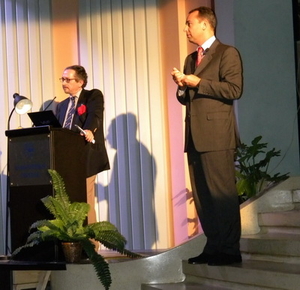 Pour la majeure partie de la planète, ça fait plus d'une décennie que le monde entier a vu le vidéoclip où le jeune de 12 ans Mohammad Al-Durah a supposément été tué par une volée de balles israéliennes près du carrefour de Netzarim dans la Bande de Gaza. À l’intérieur de quelques heures après que le caméraman Talal Abu Rahma ait filmé le corps du garçon se trouvant à côté de son père blessé, le journaliste français Charles Enderlin a ajouté un commentaire audio où l'histoire entière a été réduite en un court reportage qui a par la suite été télévisé à la télévision française et plus tard diffusé au monde entier à travers l'Internet.
Pour la majeure partie de la planète, ça fait plus d'une décennie que le monde entier a vu le vidéoclip où le jeune de 12 ans Mohammad Al-Durah a supposément été tué par une volée de balles israéliennes près du carrefour de Netzarim dans la Bande de Gaza. À l’intérieur de quelques heures après que le caméraman Talal Abu Rahma ait filmé le corps du garçon se trouvant à côté de son père blessé, le journaliste français Charles Enderlin a ajouté un commentaire audio où l'histoire entière a été réduite en un court reportage qui a par la suite été télévisé à la télévision française et plus tard diffusé au monde entier à travers l'Internet.
Take back the right to be offensive
Par David T. Jones le 4 novembre 2010
After nine years of carefully navigating between the Scylla of global revenge against the Muslim world for 9/11 and the Charybdis of insisting Islam is inherently peaceful with the 9/11 terrorists depicted as nonreligious miscreants, we have gone aground.
Americans are now impaled on the Constitutional imperative of First Amendment "free speech"-- which we have made even more a national shibboleth than the right to bear arms. Over the years, it has mattered not that many other countries have scuttled free speech and/or neutered it in practice (if it might be interpreted as "hate speech," it must be foregone or punished). We have exulted in discord.
Burma’s Potemkin Election
Par l'Hon. Irwin Cotler le 4 novembre 2010
This week, Burma will hold its first election in two decades. In the last election – May, 1990 – the National League for Democracy, lead by Aung San Suu Kyi – now an honourary Canadian citizen -- won in a landslide. Rather than taking office as Prime Minister, Suu Kyi was promptly placed under house arrest where she has remained for fifteen of the last twenty years. The military junta, which had ruled the country continually since a coup d’état in 1962, continued its reign – as if an election never even occurred.
SORENSEN
Par Beryl Wajsman le 4 novembre 2010
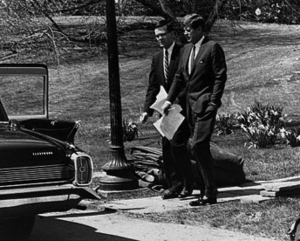 So often today, throughout the free nations of the West, we seek leadership. Not simply the elected kind that confuses bookkeeping with boldness and social engineering with social progress. We seek the kind of leadership that with clarity, candour and courage gives us confidence in ourselves and realistic hope for our nation. The kind of leadership that dares to care, refuses to merely run between the raindrops and does not let focus groups and polls determine its vision and values. This week one of the last ties to one of the last such leaders died. Theodore Chaikin Sorensen passed away at the age of eighty-two from complications of a stroke.
So often today, throughout the free nations of the West, we seek leadership. Not simply the elected kind that confuses bookkeeping with boldness and social engineering with social progress. We seek the kind of leadership that with clarity, candour and courage gives us confidence in ourselves and realistic hope for our nation. The kind of leadership that dares to care, refuses to merely run between the raindrops and does not let focus groups and polls determine its vision and values. This week one of the last ties to one of the last such leaders died. Theodore Chaikin Sorensen passed away at the age of eighty-two from complications of a stroke.
The Economics of the Long Wars
Par Robert Presser le 4 novembre 2010
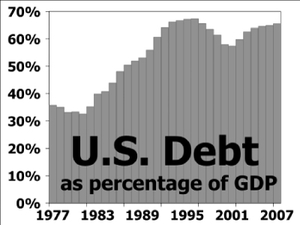 A US president comes to power promising a change in foreign policy after the previous administration is discredited by overseas wars and tensions among its allies. A recent world financial crisis, coupled with increased spending on social programs has strained government spending. Upon entering office, the new president increases US military iniiatives in the hope of bringing a swift end to the fighting. Almost two years into his mandate, the mid-term elections loom and the president is facing important losses in both the House and Senate, threatening his administration’s ability to pursue its agenda. A presidency that began with so much promise has delivered little success abroad and at home, and fears the results coming in November.
A US president comes to power promising a change in foreign policy after the previous administration is discredited by overseas wars and tensions among its allies. A recent world financial crisis, coupled with increased spending on social programs has strained government spending. Upon entering office, the new president increases US military iniiatives in the hope of bringing a swift end to the fighting. Almost two years into his mandate, the mid-term elections loom and the president is facing important losses in both the House and Senate, threatening his administration’s ability to pursue its agenda. A presidency that began with so much promise has delivered little success abroad and at home, and fears the results coming in November.
The secrets of the Sistine Chapel
Par Father John Walsh le 4 novembre 2010
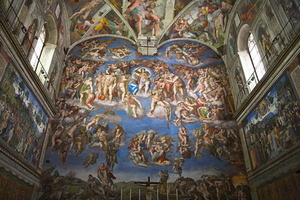 The canonization of Brother André brought many Montrealers to Rome. Inevitably they will complain about the long line-ups to visit the Sistine Chapel but will they have uncovered the secrets of the Sistine Chapel? Viewing the work of Michelangelo is breathless but does the Chapel still hold its secrets from the average visitor. The incredible frescoes required a rather complex method to prepare the plaster before the first stroke of the paintbrush would bring color to life. Imagine Michelangelo laying on his back for four and a half years painting the entire ceiling and walls of ceiling and walls of the Chapel. The Chapel is a replica, of identical size, of the Jerusalem Temple and symbolized the successionism of Catholicism over Judaism. The masterpiece has, from the time of its painting, been regarded as an affirmation of the Roman Catholic Church’s central place in the economy of salvation.
The canonization of Brother André brought many Montrealers to Rome. Inevitably they will complain about the long line-ups to visit the Sistine Chapel but will they have uncovered the secrets of the Sistine Chapel? Viewing the work of Michelangelo is breathless but does the Chapel still hold its secrets from the average visitor. The incredible frescoes required a rather complex method to prepare the plaster before the first stroke of the paintbrush would bring color to life. Imagine Michelangelo laying on his back for four and a half years painting the entire ceiling and walls of ceiling and walls of the Chapel. The Chapel is a replica, of identical size, of the Jerusalem Temple and symbolized the successionism of Catholicism over Judaism. The masterpiece has, from the time of its painting, been regarded as an affirmation of the Roman Catholic Church’s central place in the economy of salvation.
“The Jew is not my enemy!” Fatah challenges extremists within his own faith
Par Dan Delmar le 4 novembre 2010
 Religious extremism in Islam, Tarek Fatah says, is a “disease that is affecting us to the point that we’re becoming insane with our hatred. I wanted to investigate what is the root cause of the hatred of the Jews.”
Religious extremism in Islam, Tarek Fatah says, is a “disease that is affecting us to the point that we’re becoming insane with our hatred. I wanted to investigate what is the root cause of the hatred of the Jews.”
Born in Karachi, Pakistan, Fatah is the founder of the Muslim Canadian Congress and the author of the just-released “The Jew is Not My Enemy: Unveiling the Myths that Fuel Muslim Anti-Semitism.” His book tour included two stops in Montreal last week, including one at Côte St. Luc’s Beth Israel Beth Aaron Synagogue.
JFK bust moved
Par Alan Hustak le 4 novembre 2010
The bust of President John Fitzgerald Kennedy that has stood outside the Place des Arts metro station since 1986 is no longer there. Because he public square in which it stood is being rebuilt as part of the new Symphony Hall project, the statue has been taken away and JFK Square has been renamed Promenade des Artistes.
Le Monde de Piperberg
Par Roy Piperberg le 4 novembre 2010
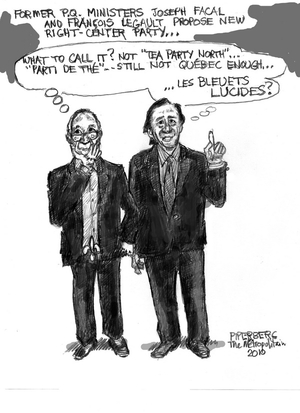
Death and Decadance: Otto Dix
Par Alan Hustak le 4 novembre 2010
“I never give any information about me in writing because you can tell at a glance my paintings contain the most accurate information about me. I have no intention of revealing to the astonished bourgeois and contemporaries the depths and abyss within my soul,” the German artist Otto Dix once wrote to a friend. That may explain why the engrossing exhibition running until January at the Montreal Museum of Fine Arts, Rouge Cabaret, A terrifying and Beautiful World, is both an immersive experience and a revelation. Not only do the 220 works on display examine the career of Otto Dix but follow a chronology that emphasizes the peculiar mix of decadence and despair which not only represents “the abyss within” his soul, but the dehumanizing times through which he lived.
October 1970: An ‘on-the-set’ education
Par Fanny La Croix le 4 novembre 2010
As we pass the 40th anniversary of the October Crisis, my thoughts turn not to the lessons learned, if any, from this not-so-quiet revolution, or to questions surrounding the state of Quebec’s ongoing war between the two solitudes.
No, my thoughts turn to that spring day when I, a young, eager Canadian actress was cast as FLQ terrorist Louise Lanctôt in a big-budget (by Canadian standards) CBC series recounting the events. A particularly vivid memory of the panic-attack that ensued comes to mind: How would I be credible in a role that would have me violently fight for the break-up of this beautiful country?
Le baby-boom, oui! Les «baby-boomers», non!
Par Pierre K. Malouf le 9 septembre 2010
Dans un article publié récemment, j’écrivais que les «baby-boomers» n’avaient pas participé à la Révolution tranquille, que les plus âgés d’entre eux, qui en 1960 venaient à peine de dépasser l’âge de la puberté, n’en avaient été que d’innocents témoins, que les plus jeunes n’étaient pas encore nés. Je vais y aller aujourd’hui d’affirmations plus choquantes encore, ce qui me vaudra, je l’espère, le privilège d’être condamné par ceux qui croient encore à l’existence de ce personnage mythique, le «baby-boomer».
Mathématiques répugnantes: Combattre le mensonge haineux et la désinformation venimeuse sur Israël et le peuple juif
Par Jacques Brassard le 9 septembre 2010
Gérald Larose est un personnage public bien connu. Il fut longtemps président de la CSN, la centrale syndicale la plus gauchiste de toutes. Il est depuis quelques années à la tête du Conseil pour la Souveraineté. Je l’ai connu et côtoyé lors des travaux de la Commission Bélanger-Campeau sur l’avenir du Québec, étant tous deux membres de cette instance. C’était une personne plutôt sympathique dans les relations interpersonnelles, mais il portait et il porte toujours la lourde défroque idéologique de la gauche.
For the decriminalization of vice
Par Dan Delmar le 9 septembre 2010
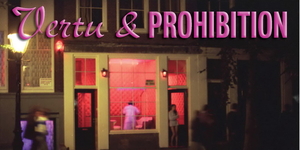 Not all that is immoral should be illegal. Behaviour deemed unacceptable by traditionalists, or even by the majority, is routinely the subject of fodder for the “There Ought To Be A Law” crowd, simply because it offends their delicate sensibilities. Rarely is there a debate about the consequences to maintaining the charade of the War on (insert vice here) and the effects of said war, which most often are in complete contradiction to the stated goals.
Not all that is immoral should be illegal. Behaviour deemed unacceptable by traditionalists, or even by the majority, is routinely the subject of fodder for the “There Ought To Be A Law” crowd, simply because it offends their delicate sensibilities. Rarely is there a debate about the consequences to maintaining the charade of the War on (insert vice here) and the effects of said war, which most often are in complete contradiction to the stated goals.
The silly season
Par Alan Hustak le 9 septembre 2010
 Summer traditionally is considered the silly season in the news business and it doesn’t get any sillier than in Quebec. There may be dumber regulatory jurisdictions in the world, but you would be hard pressed to find them. Just when you thought nothing could be sillier than the language police, or the garbage police, the tobacco police appear. You didn’t know we have tobacco police? Either did I until the Journal de Montreal broke the story that they were on the march, out in full force during the Grand Prix weekend.
Summer traditionally is considered the silly season in the news business and it doesn’t get any sillier than in Quebec. There may be dumber regulatory jurisdictions in the world, but you would be hard pressed to find them. Just when you thought nothing could be sillier than the language police, or the garbage police, the tobacco police appear. You didn’t know we have tobacco police? Either did I until the Journal de Montreal broke the story that they were on the march, out in full force during the Grand Prix weekend.
New Brunswick’s brewing language war
Par Graeme Decarie le 9 septembre 2010
Moncton, New Brunswick - There is a flag flying at house down the street from my home in Moncton, New Brunswick. At first, I took its red, diagonal cross on a white background as theold flag of St. Patrick. But a closer look showed a red and white maple leaf at the centre; and I don't think St. Pat was ever big on maple leaves No, this was the official flag of Anglophone New Brunswick.
And I think New Brunswickers, both Francophone and Anglophone, are being conned into a war that can only hurt all of them.
Pour une limite raisonnable au vertu
Par Beryl Wajsman le 9 septembre 2010
Depuis l'époque de la Prohibition des années 1920, l'histoire récente nous démontre que les tentatives de l'État de s'employer à l'ingénierie sociale sont vouées à l'échec. L'homme aura toujours ce qu'il veut; et ce faisant, affermira le soi-disant élément criminel parmi nous.
Des lois relatives aux drogues sont des lois qui n'ont pas lieu d'exister. Depuis Trudeau, les gouvernements se succédant ont tenté, et ont échoué face à une opposition virulente d'une droite rétrograde, de les radier des livres. Jusqu'à présent, les lois régissant les armes à feu auront coûté plus d'un milliard de dollars, sans commission d'enquête, et sont futiles puisque les criminels ne déclarent pas leurs armes. Faut-il une ruade pour que nos législateurs comprennent une réalité pourtant bien simple?
Harsh justice for whom?
Par Alan Hustak le 9 septembre 2010
There are bleeding-heart liberals who are said to be soft on crime and then there are the hardliners who would have us believe that, despite all evidence pointing to the contrary, crime is on the rise in Canada and the only fix is to lock up more Canadians.
About 120 out of every 100,000 Canadians, about 14,000 inmates, are doing time in Canada’s 58 federal prisons. The Harper administration now proposes to spend $2-billion to incarcerate another 4,000 because, there are supposedly perpetrators guilty of unreported crimes running loose on the streets. While it wants to build more prisons, the government also proposes an equally misguided policy that would close the country’s six prison farms which were designed, in part, to help integrate inmates back into society.
A Young Soldier’s Burden
Par R.M. Jacobs le 9 septembre 2010
A Young Soldier’s Burden
A mother’s poem to a soldier son
























